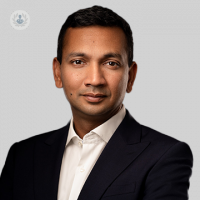Can myopia be corrected with glasses?
Autore:What exactly is short-sightedness, and does it always necessarily relate to ageing? Here to answer these answers and more is highly reputable London-based adult and paediatric ophthalmologist, Mr Saurabh Jain.

What is myopia?
Myopia, or short-sightedness, is a condition that is associated with reduced long-distance vision, but objects close to the patient appear clearer. It occurs as a result of the eyeball becoming a bit larger than it should be, and, as a result, it struggles to focus on long-distance objects.
What causes myopia? How does it relate to ageing?
There are two main factors that contribute to the development of myopia. The first is genetics. If there is a significant family history of myopia, then there is an increased chance that the person in question will also become short-sighted. The risk of this increases the higher the prevalence of myopia is in their immediate family members.
The other contributory factor is environment. People who are avid readers, especially in dimly or lowly lit spaces, have an increased chance of developing myopia.
Can myopia be corrected with glasses?
Yes. Glasses are the most effective treatment option for myopia as they have corrective lenses that supplement the ability of the eye to focus and improve the image formed upon the retina. The prescription or power of the glasses is an indicator of the length of the eyeball, so, the higher the power, the longer the eyeball, and therefore, the greater the myopia.
When is further treatment required?
Further treatment of myopia is correction in the form of glasses or contact lenses. Some people choose to have refractive surgery to obviate the need to use these. This can be done using laser, or, in some cases, an implantable lens inside the eye, which is very successful.
At times, progressive or high myopia can lead to associated conditions, with the most serious one being retinal detachment. This is characterised by a sudden worsening of vision with a curtain-like effect, and is preceded by floaters or flashes of light. If any of the symptoms are experienced, it is useful to seek urgent opinion from your optometrist or ophthalmologist.
What can be done to prevent the condition from worsening?
Myopia is a global epidemic and there have been huge increases in the degree of short-sightedness. One of the most important interventions to reduce the risk of myopia worsening is to limit the amount of time of screen time and to take frequent breaks while doing so.
The 20-20-20 rule is quite useful: every 20 minutes, it is a good idea to take a break for 20 seconds and look at something 20 feet away to ensure that the eyes are not focusing up close for prolonged periods of time. Atropine drops can also be used to slow down the progression of myopia in children, but they need to be used every day and could cause potential side effects, such as photophobia, irritation, and difficulties with near vision. New spectacle lenses with Defocus Incorporated Multiple Segments (DIMS) and Highly Aspherical Lenslet Target (H.A.L.T.) technology are also available.
Mr Saurabh Jain is a highly respected adult and paediatric ophthalmologist in London who specialises in myopia. Consult with him today via his Top Doctors profile.


